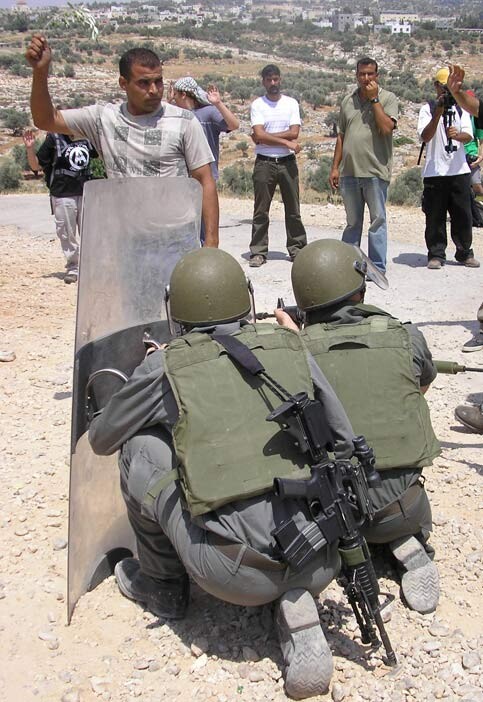IRIN 13 December 2006

Israeli soldiers will no longer have immunity from compensation claims for harm suffered by Palestinians in non-combat situations. (Tom Spender/IRIN)
Israel’s Supreme Court has overturned a controversial Israeli law banning Palestinians from claiming compensation for harm suffered at the hands of soldiers.
Citizens of “enemy states and members of terrorist organisations”, however, would not be permitted to file for compensation, according to the court’s ruling. Palestinians will also have to prove that the Israeli military operations in question did not take place as part of a clearly defined ‘war’.
Hassan Jabareen, the general director of Adalah, a body championing Arab rights in Israel, said he expected more legal wrangling over what is and what is not a combat situation.
“We foresee in the future another legal battle on the question of what is the scope of combat operations,” he said.
Known as the Intifada Law and roundly criticised by international human rights organisations, such as Amnesty International, the law was passed by the Israeli parliament - the Knesset - in July last year.
It gave the Israeli military complete immunity from claims by declaring the entire West Bank and Gaza Strip to have been a conflict zone from late 2000, when the second intifada (Palestinian uprising against Israeli occupation) broke out.
However, the Supreme Court cancelled the law on Tuesday thanks to a petition from Israeli and Palestinian human rights groups, paving the way for a flood of new claims and for old claims to be considered afresh.
“The Supreme Court’s decision has nullified one of the most racist laws legislated by the Knesset in the last five years,” said Jabareen.
“After this decision, Palestinians who have been injured or killed, or who have sustained property damage, outside the context of a so-called combat situation, can again submit tort cases for compensation in Israeli courts against the security forces.”
Law violated the rights to life
In his judgement, Chief Justice Aharon Barak stated that the law exempts the state of Israel from liability in circumstances that have nothing to do with security. He ruled that the law disproportionately violated the rights to life, dignity, and property of Palestinians in the occupied territories and was therefore unconstitutional.
It could mean good news for Palestinians who suffer harm outside a combat situation. For example, if soldiers negligently or wilfully open fire on them, torture or abuse them, or steal or destroy their property.
Matar Khamaiseh, a Palestinian vegetable dealer from Jenin, hopes he will be able to ask for compensation for the harm he has suffered. Khamaiseh was dragged to an olive grove by Israeli soldiers, beaten and shot at from close range in August this year, according to the testimony he gave human rights workers.
“This is a big step - the complete immunity that Israel had has gone,” said Yoav Loeff, spokesman for the Association for Civil Rights in Israel (ACRI).
“I don’t know the numbers but there are a lot of cases pending that will now be reactivated.”
Adalah and ACRI were among organisations claiming that the Intifada Law sent out a message that the lives and rights of those injured in a so-called conflict zone have no value, as the courts would not come to their aid and those who caused their injuries would face no punishment.
They emphasised that the law grossly violated the fundamental principles of international humanitarian law and international human rights law, which apply in the occupied Palestinian territories.
And they said it was also contrary to Israel’s own “Basic Law: Human Dignity and Liberty”, which applies to Israeli settlers in the West Bank. A decision that it did not also apply to Palestinians would create a constitutional apartheid regime, Adalah argued.
But Palestinians still face an upward battle to get compensation for harm they suffer, according to Sharwan Jabarin, general director of Al-Haq, a Palestinian human rights organisation, in Ramallah.
“This is a first step. But anyone launching a case still has to prove everything and still has only a limited time frame after the incident to get everything together for the case,” he said.
This item comes to you via IRIN, a UN humanitarian news and information service, but may not necessarily reflect the views of the United Nations or its agencies. All IRIN material may be reposted or reprinted free-of-charge; refer to the copyright page for conditions of use. IRIN is a project of the UN Office for the Coordination of Humanitarian Affairs.
Related Links